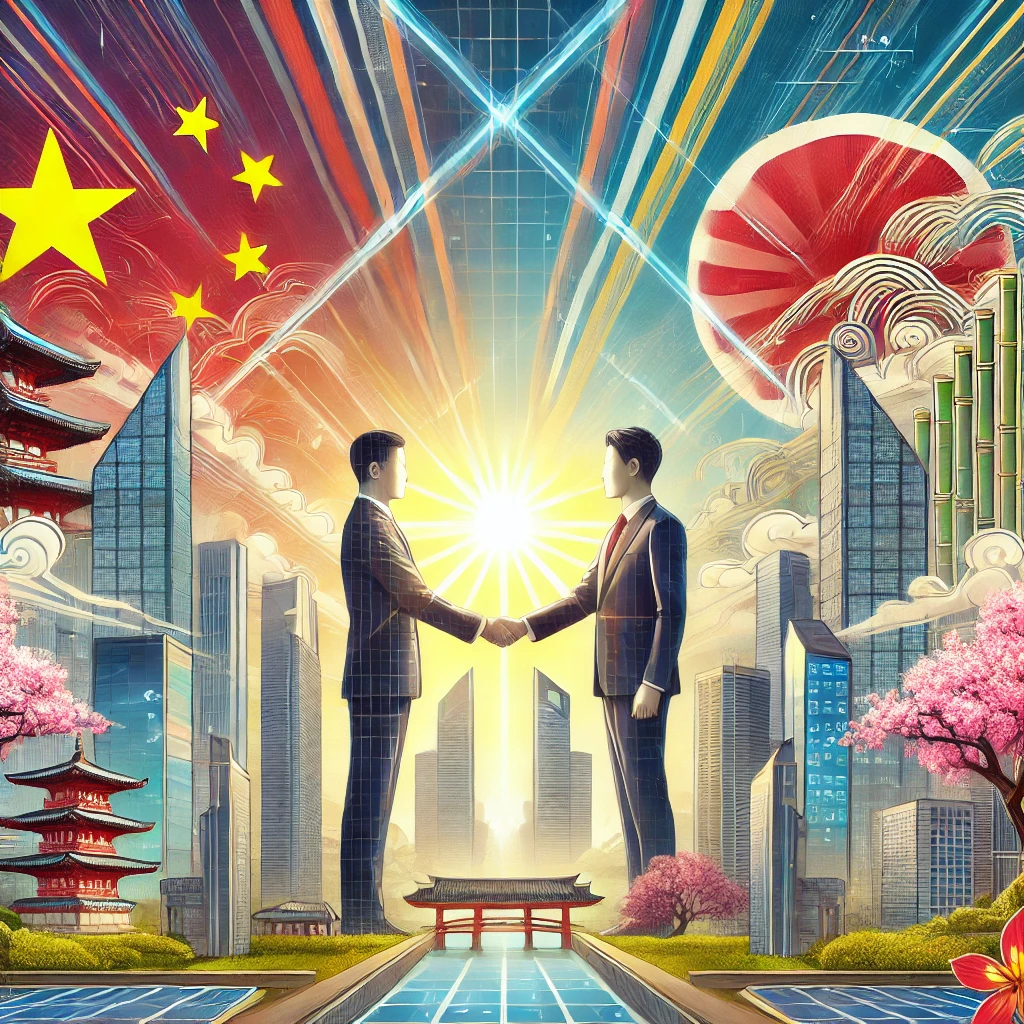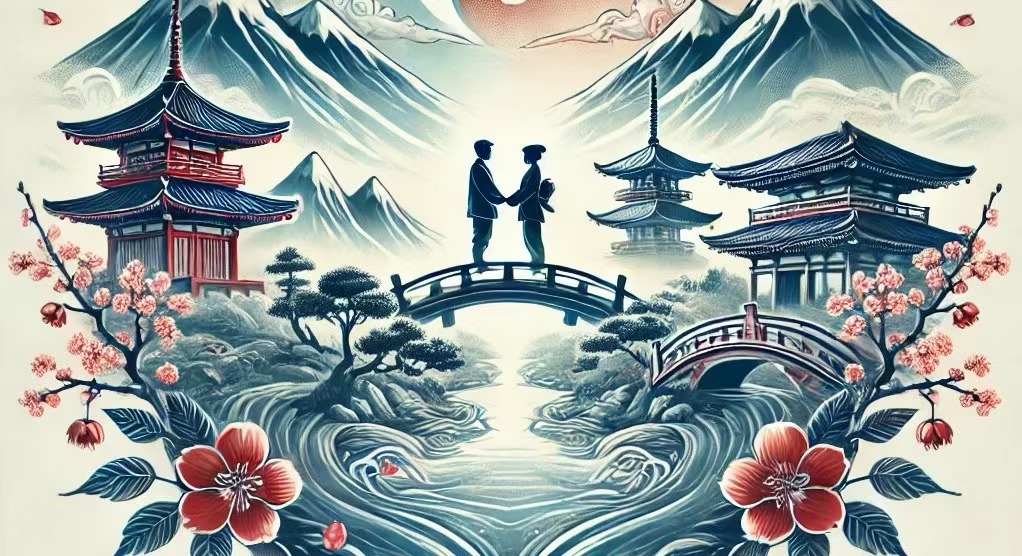近年重提“山川异域,风月同天”时,这句话表达了不同国家和民族即使身处异域,也能共享同一片天空的命运与共鸣。《唐大和上东征传》记载:“日本国长屋王崇敬佛法,(造)千袈裟,(来施)此国大德众僧,其袈裟(缘)上绣着四句曰:山川异域,风月同天。寄诸佛子,共结来缘。”这句经典的话源于中日文化和佛教交流历史,出自隋唐时期日本著名政治家长屋亲王的言论,表达了希望中国高僧能去日本传授佛法的愿望。
2020年2月,日本汉语水平考试事务所在捐赠给湖北的物资外包装上再次使用了这八个字,显示了在当今复杂的中日关系中,这一理念仍然具有深远的现实意义。尽管中日两国因近代历史的积怨仍存芥蒂,但如果我们能超越仇恨,从中吸取教训,学习彼此的优点,转向自我提升,就能真正实现自我超越与民族复兴。

就好比两个剑客在比拼时,其中一方受伤并非意味着对方的全部行为都是不可取的。如果受伤的一方沉溺于仇恨、怨天尤人,只会迷失心智、丧失冷静判断的能力。真正的高手应该在反思失败的同时密切观察对方的招式,从中汲取对方剑术中的精妙之处,融会贯通,并不断打磨自己的技艺,最终达到新的高度。
对于今天的中国而言,亦是如此,特别是在中国传统文化与基督教信仰的双重视角下,我们应当借助宽恕、反思与自省的力量,避免被历史的仇恨所困,走向和解与发展。本文将从基督教为主、中国传统文化为辅的角度,探讨如何调解仇日情绪,并学习战后日本崛起的经验,以此提升自我,实现真正的民族复兴。
基督教中的宽恕与爱:从仇恨走向超越
圣经里说的“爱人如己”是耶稣传递给门徒的重要教导之一。耶稣要求我们不仅要爱与自己和谐相处的人,还要爱那些曾伤害我们的人:“你们要爱你们的仇敌,为那逼迫你们的祷告”(《马太福音》5:44)。这教义呼吁人们在行为上宽恕他人,同时也从内心深处走出仇恨,寻求真正的和解与爱。
对于中国人来说,面对日本曾经的侵略历史,许多人依旧难以释怀,这种情感反应是可以理解的。然而,圣经提醒我们,仇恨不能带来真正的解决之道,宽恕才是获得内心平安的关键。耶稣的教导不仅是对过去创伤的救赎,更是对未来的期许。只有通过宽恕,我们才能为自己和社会创造出一条通向和解的道路。
强调宽恕并不意味着遗忘,而是选择不让仇恨掌控我们的未来。这种宽恕不是软弱的表现,而是超越仇恨、迎接和平的内在力量。正如《罗马书》所言:“要心意更新而变化”(12:2),这些教导帮助我们从历史的阴影中走出来,通过宽恕与爱,找到更广阔的世界观与生命意义。
传统文化中的宽容与反思:追求内在平和
中国传统文化历来推崇“和而不同”,强调从自身出发,寻找解决问题的途径。儒家思想中的“修身齐家治国平天下”思路,提醒我们要从自我反思和修炼开始,通过不断完善自我,最终实现家国的和平与和谐。在面对中日历史问题时,我们不仅要反思历史带来的伤痛,更要通过自我提升来超越对立的情绪。
孔子在《论语》中提到:“己所不欲,勿施于人。”意思是我们不应将自己所憎恶的事强加于他人,这与基督教中的“爱人如己”理念相通。我们在面对历史问题时,不应一味陷入仇恨情绪,而要通过宽容与反思,重新看待两国关系。
中国传统文化强调的自省精神,也是化解仇日情绪的重要路径之一。古人常讲“吾日三省吾身”,提醒人们要不断反思自己是否言行得当。面对历史问题,人们也应当在民族情感之外,从理性角度审视如何从过去的创伤中走出来,并通过修养内心,寻求和平与和解。正如孔子所言:“德不孤,必有邻。”我们提升自身,才能更好地与世界接轨,实现真正的民族振兴。
学习战后日本的崛起:从伤痛中反思并自我提升
日本在二战后迅速从废墟中崛起,成为全球第二大经济体的历程,充满了许多值得中国学习的经验。日本在经历了战争的毁灭性打击后,选择放下仇恨,专注于经济重建、科技发展和教育改革。中国若想实现自我超越,同样应当通过理性反思与自我提升,借鉴日本战后崛起的经验,眼光向内、着力民生,提升人民的生活水平和生活质量。
1. 深刻反思与和平宪法:学习自我反省的勇气
日本战后通过深刻的自我反思,重新规划了国家的未来发展方向。他们通过反思军国主义,放弃了对外扩张,确立了“和平宪法”,将国家的重心放在经济复兴与科技创新上。这种对历史的反思与重新定位,体现了传统文化中的“以史为鉴,可以知兴替”思想。
中国更应借鉴这一点,从历史中汲取教训,避免过度的情感对抗,专注于建设未来。在国家发展战略中,通过和平与合作,塑造一个更加开放、自信的国家形象。
2. 教育与科技的长远投入:专注长期发展的智慧
日本的崛起离不开对教育和科技的重视。他们在战后大量投资于教育体系,通过教育改革和科研创新,培养出具有全球竞争力的高素质人才。这与中国传统文化中强调“学而不厌,诲人不倦”的学习精神相呼应。中国要实现对日本的超越,不仅需要在经济增长上取得突破,更要在教育和科技创新领域投入长期的精力,而不是让辛辛苦苦培养出的人才去送外卖、当城管甚至去搬砖。
中国传统文化历来强调“知行合一”,即将知识和实践结合起来。中国应当从日本的科技发展路径中学习如何将知识转化为生产力,通过培养创新型人才和推动高新技术产业,提升国际竞争力。这种对知识和创新的专注,以及对各行业的有序推动,正是我们实现自我超越的关键。
3. 国际合作与文化交流:学习全球视野
日本通过积极参与国际事务与全球经济合作,逐步恢复了国际形象。中国同样应当通过开放的态度和务实的外交政策,积极融入全球体系。中国传统文化讲求“己欲立而立人,己欲达而达人”,这意味着我们不仅要关注自身发展,也要推动全球共同繁荣。
通过国际合作与文化交流,中国可以借鉴其他国家的先进经验,提升自身的国际影响力。通过国际合作实现国家复兴,不仅能帮助我们找到更多发展机遇,也能进一步增强中国在全球事务中的话语权。

谦卑学习与超越:宽恕与自省是复兴之道
无论是基督教的宽恕精神,还是中国传统文化中的自省智慧,调解仇日情绪的关键在于从历史中汲取教训,走向超越。人们更应当以谦卑的态度,向日本和其他发达国家学习其战后崛起的经验,避免陷入情感对抗的误区。
再说一遍,宽恕并不意味着软弱,而是为了更强大的内在自信。人们应当通过提升自身素质,专注于教育、科技、文化等各个领域的长远发展,实现真正的自我超越。这既是对历史的负责,也是对未来的展望。我们这一代面对子孙后代时不应该只讲仇恨的往事,而应是我们如何崛起的经历。
聚焦民主与民生:构建长远发展基础
在推动民族复兴的过程中,除了经济增长外,各行各业需要更加关注民主与民生,这些与人民息息相关的领域将直接影响国家的长期发展潜力。民主不仅仅是政治参与的形式,更是一种能够让每个人在社会中找到自己的位置、发挥个人价值的方式。通过加强民主,能够更好地集聚民智,鼓励百花齐放,而不是单单的统一思想,扼杀个体的创新能力。
同样,民生问题,如医疗、教育、住房、就业等,直接决定了人民的生活质量。一个强大的国家必须让每个公民都享有基本的生活保障和发展的机会,而不是眼睁睁地让那些和我们不相干的国家白白享受中国人民血汗换来的红利。通过持续推动民生改革,确保社会的公平与稳定,国家才能够长期发展。
超越的关键:做好自己的眼前工作
无论是与日本的竞争还是面对全球化带来的挑战,中国人都应当从根本上提升自身,专注于眼前的工作和生活质量,停止底层的相互伤害。从农民种的粮食蔬菜健康、从每一份食品制作、从每一个病号的治疗做起,善待和自己一样身处社会底层的陌生人,不做糊里糊涂的“大多数”,各行各业用自己的爱心击溃资本和政治的利益链,这才是民族复兴的真正基础。通过每一个中国人的努力,提升生活水平、优化社会结构,我们将为国家未来的崛起奠定基础。不要再被历史的仇恨蒙蔽双眼,而应当用实际行动去推动所处环境的进步。关注身边的事物,从自己开始,不断提升自己的生活质量和职业能力,才能净化我们的生存环境。
结语:从仇视到自我超越
说了这么多,您是否想到日方在中国疫情期间重提“山川异域,风月同天”的含义?换个角度,有没有一种可能是经历了战后70多年的日本已领略了发展经济、提高人民生活水平带来的巨大利益后也善意地提醒我们该如何面对共同的过去、须积极面对的现在和全民都该拥有的美好将来?

尽管中日两国有着不同的历史和文化背景,但人类社会的共同命运将两国紧密联系在一起。中国人民应当通过既有的宽恕精神和传统文化中的自省智慧,走出历史仇恨的阴影,转而学习日本的成功经验,提升自身素质,实现真正的自我超越。
面对历史的伤痛,仇恨并非唯一的答案,一个更加自信、强大的国家是从每个人为所生活的环境优化做起的,赢得他国尊重的不是大把大把的扔钱,而是改善自己的生活水平和生活质量,乌托邦式的国家终究不是你我的选择。人的切身利益和自由高于一切,离开这些谈其他的都是空谈。
让我们一起为此祷告!
(如有建议敬请留言讨论,邮箱:[email protected])
Revisiting “Mountains and Rivers Differ, Yet the Wind and Moon Are Under the Same Sky”: What Does It Mean?
In recent years, the phrase “Mountains and Rivers Differ, Yet the Wind and Moon Are Under the Same Sky” has been invoked anew. This expression conveys the sentiment that even when people of different nations and ethnicities live apart, they still share the same sky and, in doing so, share a common destiny and resonance. As recorded in The Biography of the Tang Dahe Expedition to the East, it is said:
“Prince Nagaya of Japan, who greatly revered Buddhism, (had) created a thousand kasaya robes, and sent them to gift the great virtuous monks of this country. On the kasaya there were embroidered four lines saying, ‘Though our mountains and rivers differ, the wind and moon are under the same sky. To all the Buddha’s children, let us join our destinies together.’”
This classic phrase originates from the historical and cultural exchanges between China and Japan, as well as from Buddhist interactions during the Sui-Tang period. It is attributed to the famous Japanese statesman Prince Nagaya and expresses the hope that revered Chinese monks would go to Japan to transmit Buddhism.
In February 2020, the Japan Chinese Proficiency Test organization once again used these eight characters on the outer packaging of donated supplies to Hubei, signaling that in today’s complex Sino-Japanese relations, this sentiment remains profoundly relevant. Although there remains a lingering resentment from modern history, if we can overcome hatred, learn from each other’s strengths, and turn our attention to self-improvement, we may truly achieve personal transcendence and national rejuvenation.

It is much like two swordsmen dueling: if one is injured, it does not mean that everything the other has done is inherently wrong. If the injured one wallows in hatred and curses fate, he loses his calm and clarity of judgment. A truly skilled swordsman, on the other hand, while reflecting on his own failures, will keenly observe his opponent’s techniques, learn from their subtle insights, integrate them, and constantly hone his own skills—ultimately reaching new heights.
For today’s China, this is equally true. Especially when viewed through the dual lenses of traditional Chinese culture and Christian faith, we should harness the power of forgiveness, reflection, and self-examination to break free from the shackles of historical enmity, moving instead toward reconciliation and development. This article explores how to ease anti-Japanese sentiments from a primarily Christian perspective—with traditional Chinese cultural insights as a complement—by drawing lessons from Japan’s postwar rebirth, thereby enhancing self-improvement and achieving true national rejuvenation.
I. Forgiveness and Love in Christianity: From Hatred to Transcendence
The Bible commands us to “love your neighbor as yourself,” a core teaching given by Jesus to His disciples. He calls us not only to love those with whom we live in harmony but also those who have hurt us:
“But I say to you, love your enemies, bless those who curse you, do good to those who hate you, and pray for those who spitefully use you and persecute you,” (Matthew 5:44 NKJV).
This teaching calls for both outward forgiveness and an inner departure from hatred, leading ultimately to genuine reconciliation and love. For many Chinese facing Japan’s historical aggression, deep-seated resentment is understandable. However, the Bible reminds us that hatred cannot bring true resolution—only forgiveness can bestow genuine inner peace. Jesus’ words provide redemption not just for past wounds but also set an expectation for the future. Only by forgiving can we create a pathway to reconciliation for ourselves and for society.
It is important to note that emphasizing forgiveness does not mean forgetting; it means choosing not to let hatred control our future. Such forgiveness is not a sign of weakness but a profound inner strength that transcends animosity. As Romans 12:2b NKJV exhorts, “be transformed by the renewing of your mind…” These teachings help us step out from the shadows of history and, through forgiveness and love, develop a broader vision and a deeper sense of life’s meaning.
II. Tolerance and Reflection in Traditional Chinese Culture: Pursuing Inner Peace
Chinese traditional culture has long upheld the value of “unity in diversity” and emphasizes that solutions must be sought from within. The Confucian ideal of “cultivate oneself, regulate the family, govern the state, bring peace to the world” reminds us to start with self-reflection and self-improvement—so that ultimately peace and harmony in family and nation are achieved. When confronting the historical issues between China and Japan, we should not only reflect on the pain of the past but also transcend rivalry through self-enhancement.
Confucius taught in the Analects, “Do not do to others what you do not want done to yourself.” This shares a common thread with the Christian principle of “love your neighbor as yourself.” In addressing historical issues, we should avoid sinking into a mire of hatred. Instead, through tolerance and reflection, we can reframe Sino-Japanese relations.
Chinese traditional culture also emphasizes self-examination—a vital approach to dispelling anti-Japanese sentiments. The ancients often said, “I examine myself three times a day,” reminding us to continuously reflect on whether our words and actions are appropriate. In doing so, we can not only heal from historical wounds but also cultivate an inner peace that paves the way for reconciliation. As Confucius noted, “Virtue is never left alone; it always has neighbors.” By uplifting ourselves, we better connect with the world and ultimately achieve real national rejuvenation.
III. Learning from Japan’s Postwar Rebirth: Reflecting on Pain and Improving Oneself
Japan’s remarkable recovery after World War II—transforming from ruins into the world’s second-largest economy—offers many lessons that China can learn from. After suffering devastating losses in the war, Japan chose to let go of hatred and focused on economic reconstruction, technological development, and educational reform. For China to achieve self-transcendence, it too must engage in rational reflection and self-improvement, drawing on Japan’s postwar experience. Turning one’s focus inward and prioritizing the well-being of the people—thereby improving the standard and quality of life—is essential.
- Profound Reflection and the Pursuit of a Peaceful Constitution:
After the war, Japan underwent deep self-reflection and charted a new course for national development. By reconsidering its militaristic past and embracing a “peace constitution,” Japan shifted its focus to economic recovery and technological innovation. This process of reflection and repositioning embodies the ancient Chinese adage, “Learn from history to know the rise and fall of nations.” For China, the lesson is to draw from historical experiences—avoiding excessive emotional confrontation while focusing on building the future. In national development strategy, fostering peace and cooperation can help shape a more open and confident national image.
- Long-Term Investment in Education and Technology:
Japan’s ascent was greatly aided by its postwar investments in education and technology. By reforming its educational system and prioritizing research and innovation, Japan nurtured a globally competitive workforce. This echoes the Chinese tradition of lifelong learning, epitomized by the saying “Study without ceasing, teach without tiring.” To surpass Japan, China must not only achieve breakthroughs in economic growth but also commit enduring efforts to education and technological innovation. The focus should be on nurturing innovative talent and advancing high-tech industries, rather than simply having hard-earned talent work in low-wage jobs. Chinese culture has always stressed the principle of “unity of knowledge and action”—knowledge must be translated into productivity. This dedication to innovation and order across industries is key to genuine self-transcendence.
- International Cooperation and Cultural Exchange: Embracing a Global Vision
Through active participation in international affairs and global economic cooperation, Japan gradually restored its international image. Similarly, China should adopt an open and pragmatic diplomatic policy to engage with the global community. The Chinese adage “Help others to stand as well as yourself” implies that we must focus not only on our own development but also on promoting global common prosperity. By engaging in international cooperation and cultural exchange, China can learn from other advanced nations and raise its international influence. Achieving national rejuvenation through global collaboration will not only create more development opportunities but also enhance China’s voice in world affairs.

IV. Humble Learning and Transcendence: Forgiveness and Self-Reflection as the Way to Revival
Whether in the forgiving spirit of Christianity or in the self-examining wisdom of Chinese traditional culture, the key to alleviating anti-Japanese sentiments lies in learning from history and moving beyond it. We should approach Japan and other developed nations with humility and learn from their postwar experiences, avoiding the pitfalls of emotional confrontation.
Let it be clear that forgiveness does not imply weakness; rather, it fosters a stronger inner confidence. People must improve themselves and focus on the long-term development of education, technology, and culture, to truly achieve self-transcendence. This is not only a responsibility to history but also a hopeful outlook for the future. Our generation should not merely recount tales of hatred but share our experiences of how we rose again.
V. Focusing on Democracy and People’s Livelihood: Constructing a Foundation for Long-Term Development
In the process of national rejuvenation, besides economic growth, every sector must pay close attention to democracy and people’s livelihood, as these areas directly affect the long-term development potential of a country. Democracy is not only a form of political participation; it is also a means for every individual to find a place in society and to fully realize their personal value. Strengthening democracy helps to gather collective wisdom and encourages a plurality of ideas, rather than forcing uniformity that stifles individual innovation.
Likewise, issues such as healthcare, education, housing, and employment directly determine the quality of life for the people. A strong nation must ensure that all citizens enjoy basic life security and development opportunities—not simply let other countries reap the dividends that come from the sweat of the Chinese people. Through persistent reform in these fields, ensuring fairness and stability, the nation can sustain long-term growth.
VI. The Key to Transcendence: Focus on What Is in Front of You
Whether facing competition with Japan or the challenges brought by globalization, Chinese people should fundamentally work to improve themselves, concentrate on their immediate tasks, and avoid inflicting harm on each other from the ground up. Beginning with cultivating healthy crops and vegetables, producing high-quality foods, and treating every patient with care—show compassion to fellow citizens who, like you, belong to society’s base. It is only by using our love and diligence to break the chains of capitalist and political interests that we lay the true foundation for national rejuvenation. Through the efforts of each Chinese citizen—by raising living standards and optimizing social structure—we will pave the way for our nation’s future rise. Let us no longer be blinded by historical hatred; instead, we must drive progress through concrete actions, focusing on the here and now and continuously improving our quality of life and professional competence to purify our environment.
Conclusion: From Hatred to Self-Transcendence
Have you noticed that during the COVID-19 period in China, the Japanese once again invoked the phrase “Mountains and Rivers Differ, Yet the Wind and Moon Are Under the Same Sky”? Perhaps, from another angle, it reflects the possibility that after more than 70 years following the war, Japan—having experienced the enormous benefits of economic development and rising living standards—willingly reminds us how to face our common past, confront the urgent challenges of the present, and build a promising future for all.
Although China and Japan have different histories and cultural backgrounds, the shared destiny of all humanity binds our two nations closely together. The Chinese people should, drawing on both the spirit of forgiveness and the self-reflective wisdom of traditional culture, emerge from the shadows of historical enmity and instead learn from Japan’s postwar success, improving our own qualities in the process and achieving genuine self-transcendence.
Facing the wounds of history, hatred is not the only answer. A more confident and powerful nation is built by each individual optimizing their environment. Respect from other countries is earned not by throwing money around but by improving one’s own living standards and quality of life—utopian dreams are never our choice. Personal interests and freedom are paramount; without these, any other discussion is mere empty talk.
Let us pray together for this cause!

发表回复